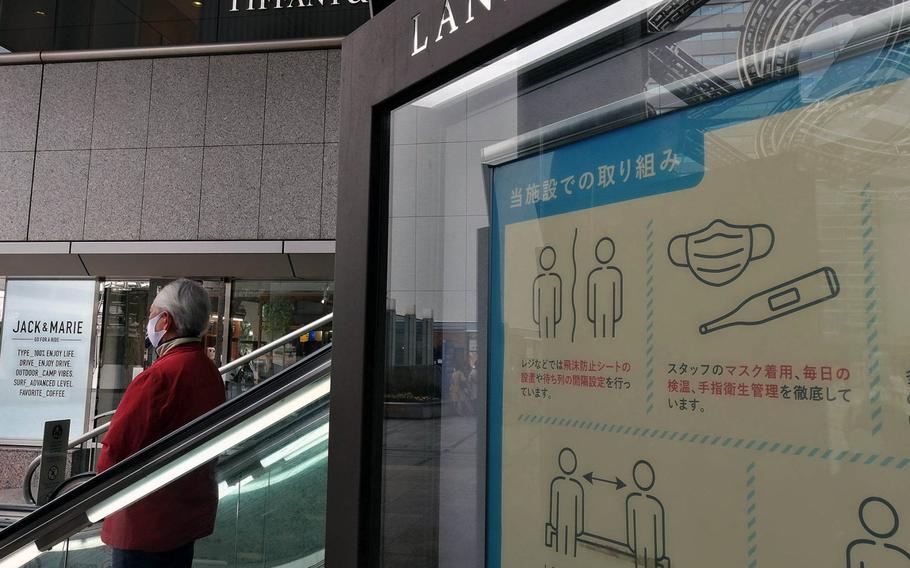
Signs at a shopping area in Yokohama, Japan, urge customers to take measures to prevent a coronavirus infection, Jan. 6, 2021. (Akifumi Ishikawa/Stars and Stripes)
Stars and Stripes is making stories on the coronavirus pandemic available free of charge. See other free reports here. Sign up for our daily coronavirus newsletter here. Please support our journalism with a subscription.
TOKYO – U.S. military bases in Japan and South Korea reported 15 new coronavirus cases as of 6 p.m. Thursday, while Japan’s capital city counted more than 1,000 new patients for the ninth consecutive day.
Another 1,471 people in Tokyo tested positive on Thursday, according to public broadcaster NHK. More than 90,000 people in the city have become infected with the virus and at least 754 have died during the pandemic, according to metro government data. The recent wave of infections peaked Jan. 7 with 2,447 new patients.
A handful of U.S. bases are within the larger metro area, including the headquarters of U.S. Forces Japan, U.S. Army Japan and the Navy’s 7th Fleet.
Naval Air Facility Atsugi, 24 miles southwest of central Tokyo, reported four new coronavirus infections: one tested positive after recently arriving in Japan and three were already quarantined, said base spokesman Sam Samuelson. He did not know why the three were quarantined.
Marine Corps Air Station Iwakuni, 500 miles west of Tokyo, reported one new coronavirus patient, an individual screened prior to deployment and already isolated, according to a Facebook post.
In a separate post Thursday, installation commander Col. Lance Lewis passed word that the Moderna vaccine against COVID-19, the coronavirus respiratory disease, will arrive soon.
“No Marine or Sailor likes be on the defensive, so I’m pleased to say that this weekend, we go on the attack with the arrival of the vaccine for which your chain of command will have the details about priorities and mechanics,” Lewis wrote. “Although it remains voluntary at this time, I encourage everyone to get the vaccine when your name is called.”
The vaccine, which initially arrived at six other installations in Japan on Dec. 26, is distributed according to priorities set in a three-phase plan that starts with medical care providers, first responders and security forces and culminates with the healthy, general population.
So far in January, MCAS Iwakuni has reported 75 cases of coronavirus and imposed a daylong lockdown to permit contact tracing and curb the virus’ spread.
U.S. Forces Korea on Thursday reported 10 new coronavirus cases, seven of them new arrivals to the peninsula between Jan. 6 and Wednesday, according to a news release.
One service member arrived at Osan Air Base on Wednesday aboard the Patriot Express, a government-chartered passenger air service. Another service member, two contractors and three dependents arrived via commercial flights at Incheon International Airport on Jan. 6, Sunday and Tuesday.
Five came up positive on their first test after arriving; two tested positive while quarantined. All were further quarantined at Osan or Camp Humphreys, according to USFK.
The remaining three individuals tested positive on Wednesday after developing COVID-19 symptoms, according to a separate USFK release Thursday.
The first, a Defense Department civilian employee at Yongsan Garrison in Seoul, last visited Yongsan on Monday, according to USFK.
The second, the spouse of another DOD employee, had been quarantined at home in Seoul since Jan. 14 before moving to a South Korean medical facility. Her spouse tested positive Saturday.
The third new patient is a service member at Kunsan Air Base, according to USFK.
The service member and DOD employee are quarantined on U.S. installations, according to USFK.
South Korea reported 401 newly infected people on Wednesday, continuing a fall in new cases from a high on Dec. 25 of 1,235, according to the Central Disease Control Headquarters and the World Health Organization.
ditzler.joseph@stripes.com Twitter: @JosephDitzler